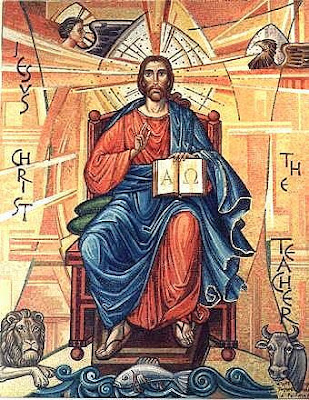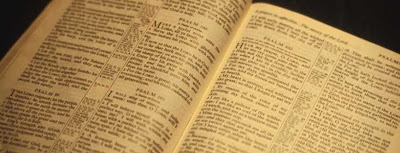 Some people read the Bible as a historical document, taking note of context, criticizing the Word of God from a humanistic perspective. Perhaps this kind of study has value, but does it shed light on our lives and our times, bringing redemption, and producing fruits that feed us?
Some people read the Bible as a historical document, taking note of context, criticizing the Word of God from a humanistic perspective. Perhaps this kind of study has value, but does it shed light on our lives and our times, bringing redemption, and producing fruits that feed us? I believe what C. S. Lewis wrote in his children’s book, The Silver Chair, can be applied to the holy scriptures, the written Word of God. When the children in the story are mocked for believing in one of the signs that Aslan [the Lord] provided, and told that their interpretation of it was mistaken because they weren’t putting it in the context in which it was written, that they were unhappily victims of an historical accident, their faithful guardian rebukes the mocker with these words, “Don’t you mind him. There are no accidents. Our guide is Aslan, and he was there when the giant king caused the letters to be cut, and he knew already all things that would come of them, including this.” The mocker was a prince under an enchantment, being prepared to rule a land by force in subjection to an evil sorceress, a land that was his to rule by right, because he was himself its legal sovereign. This is so much like what we find in the “real” world. We can fall under satan’s spell and, denying God’s infallible signs, we can find ourselves paying dearly for that which is already ours by right. Jesus Christ has paid the price in advance for us, yet we would rather pay for it ourselves. Pursuing our thoughts, we abandon the Holy Spirit’s gift to us of the mind of Christ. We give up thinking His thoughts, so we can think our own. What’s so liberating about that?
I believe what C. S. Lewis wrote in his children’s book, The Silver Chair, can be applied to the holy scriptures, the written Word of God. When the children in the story are mocked for believing in one of the signs that Aslan [the Lord] provided, and told that their interpretation of it was mistaken because they weren’t putting it in the context in which it was written, that they were unhappily victims of an historical accident, their faithful guardian rebukes the mocker with these words, “Don’t you mind him. There are no accidents. Our guide is Aslan, and he was there when the giant king caused the letters to be cut, and he knew already all things that would come of them, including this.” The mocker was a prince under an enchantment, being prepared to rule a land by force in subjection to an evil sorceress, a land that was his to rule by right, because he was himself its legal sovereign. This is so much like what we find in the “real” world. We can fall under satan’s spell and, denying God’s infallible signs, we can find ourselves paying dearly for that which is already ours by right. Jesus Christ has paid the price in advance for us, yet we would rather pay for it ourselves. Pursuing our thoughts, we abandon the Holy Spirit’s gift to us of the mind of Christ. We give up thinking His thoughts, so we can think our own. What’s so liberating about that? The prophets of Israel still speak to our condition today, even today more than ever. Though originally spoken to God’s hereditary people Israel, we who are in Christ have been grafted into them. Their Tanakh is our Old Testament. Though prophecies specific to the nation Israel in past, present and future mustn’t be applied wrongly to just anyone, as many sectarians do, the other words of the prophets that reveal God’s will not only to Israel but to the human race, can be read and taken to heart for our correction. It’s this kind of reading that the learned and clerical establishment regard with contempt, as being childish and backward. But the holy apostle Paul is not one of them, for he quotes in his first letter to the church at Corinth, “I will destroy the wisdom of the wise; the intelligence of the intelligent I will frustrate,” (Isaiah 29:14) and he goes on to lay down the relationship of the wisdom of men to God’s Wisdom (1 Corinthians 1:18-31).
The prophets of Israel still speak to our condition today, even today more than ever. Though originally spoken to God’s hereditary people Israel, we who are in Christ have been grafted into them. Their Tanakh is our Old Testament. Though prophecies specific to the nation Israel in past, present and future mustn’t be applied wrongly to just anyone, as many sectarians do, the other words of the prophets that reveal God’s will not only to Israel but to the human race, can be read and taken to heart for our correction. It’s this kind of reading that the learned and clerical establishment regard with contempt, as being childish and backward. But the holy apostle Paul is not one of them, for he quotes in his first letter to the church at Corinth, “I will destroy the wisdom of the wise; the intelligence of the intelligent I will frustrate,” (Isaiah 29:14) and he goes on to lay down the relationship of the wisdom of men to God’s Wisdom (1 Corinthians 1:18-31). The prophets of Israel still have much to say to us, much to instruct, much to warn. Here are just a few verses that I’d like to share from my much marked up study bible (the one pictured in my side panel under Books I’m working through), verses to “read, mark, learn, and inwardly digest” (BCP, proper 28). Kali sarakostí to all who are observing the great fast, and God’s blessing.
The prophets of Israel still have much to say to us, much to instruct, much to warn. Here are just a few verses that I’d like to share from my much marked up study bible (the one pictured in my side panel under Books I’m working through), verses to “read, mark, learn, and inwardly digest” (BCP, proper 28). Kali sarakostí to all who are observing the great fast, and God’s blessing.Seek Yahweh while He is still to be found,
Call to Him while He is still near.
Let the wicked man abandon his way,
The evil man his thoughts.
Let him turn back to Yahweh who will take pity on him,
To our God who is rich in forgiving;
For My thoughts are not your thoughts,
My ways not your ways—it is Yahweh who speaks.
Yes, the heavens are as high above the earth
as My ways are above your ways,
My thoughts above your thoughts.
Yes, as the rain and the snow come down from the heavens and do not return without watering the earth, making it yield and giving growth to provide seed for the sower and bread for the eating, so the Word that goes forth from My mouth does not return to Me empty, without carrying out My will and succeeding in what it was sent to do.
Isaiah 55:6-11 Jerusalem Bible
Thus says Yahweh,
“Let the sage boast no more of his wisdom,
nor the valiant of his valor,
nor the rich man of his riches!
But if anyone wants to boast, let him boast of this:
Of understanding and knowing Me.
For I am Yahweh, I rule with kindness,
Justice and integrity on earth;
Yes, these are what please Me—
It is Yahweh who speaks.”
Jeremiah 9:22-23 JB
Come, let us return to Yahweh.
He has torn us to pieces, but He will heal us;
He has struck us down, but He will bandage our wounds;
After a day or two He will bring us back to life,
On the third day He will raise us
And we shall live in His presence.
Let us set ourselves to know Yahweh;
That He will come is as certain as the dawn;
His judgment will rise like the light,
He will come to us as showers come,
Like spring rains watering the earth.
Hosea 6:1-3 JB
What god can compare with You:
Taking fault away, pardoning crime,
Not cherishing anger for ever
But delighting in showing mercy?
Once more have pity on us,
Tread down our faults,
To the bottom of the sea throw all our sins.
Micah 7:18-19 JB
 There is much, much more in the prophets than these encouragements. There are words of judgment also, but I haven’t quoted these, lest I seem to casting stones at others. Yet it is the prophets’ words of God’s judgment that should fall on our ears and convert our hearts, preparing us for the Day of the Lord.
There is much, much more in the prophets than these encouragements. There are words of judgment also, but I haven’t quoted these, lest I seem to casting stones at others. Yet it is the prophets’ words of God’s judgment that should fall on our ears and convert our hearts, preparing us for the Day of the Lord.Keep yourselves in the Word, brothers, watch and pray. For the time is close (cf. Revelation 1:3).
The light of Israel will become a fire
And its Holy One a flame
Burning and devouring thorns
And briars in a single day.
Isaiah 10:17 JB
































